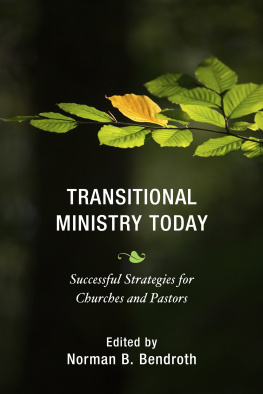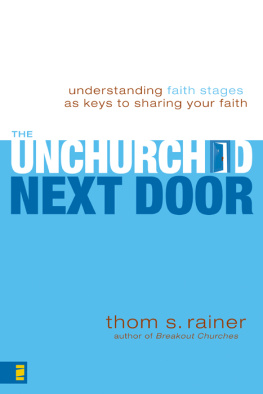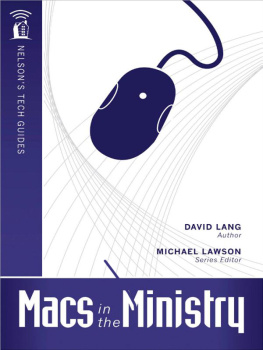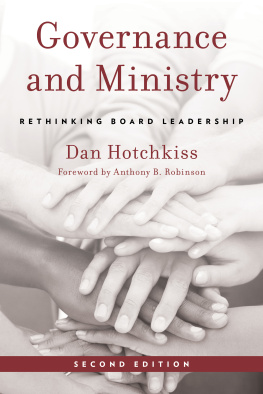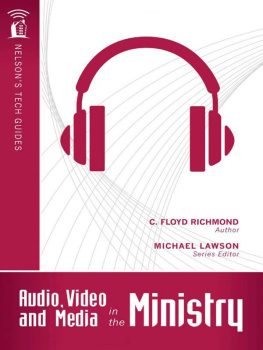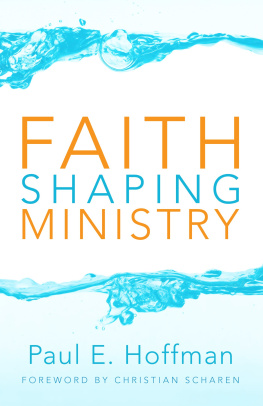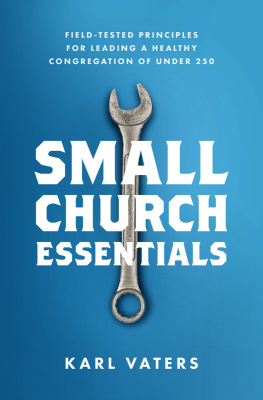
Copyright 1996 by the Alban Institute. All rights reserved.
This material may not be photocopied or reproduced in any way without written permission. Go to http://www.alban.org/permissions.asp or write to the address below.
The Alban Institute
2121 Cooperative Way, Suite 100
Herndon, VA 20171
Verses marked KJV are from The Holy Bible, King James Version, and are in the public domain.
Verses marked TLB are from The Living Bible, copyright 1971 Tyndale House Publishers, Inc. Used by permission.
Library of Congress Catalog Card Number 95-83893
ISBN 1-56699-169-2
ACKNOWLEDGMENTS
Appreciation for assistance in preparing this book is expressed to the people at Aid Association for Lutherans who were instrumental in funding the project. President Dick Gunderson and the AAL board of directors provided ample funding and encouragement. Fraternal vice-president Glen Ocock allowed wide operational latitude for project activities. Without that freedom, the project would have not been sufficiently flexible to pursue new directions when unexpected opportunities arose. Fred Pahl and Doug Olson provided stability and assistance to a rapidly evolving line of study.
Cheryl Brown deserves special recognition for the substantial role she played in the project. Cheryl provided key insights at critical design and interpretation stages of several studies. She was instrumental in keeping everyone focused on the core issueour Lords Great Commission.
Twenty-three researchers from varied backgrounds and disciplines participated in data collection. The appendix lists the data collection leaders. These people are skilled researchers. They are also enthusiastic about the work of the church. Their determination to discover true solutions resulted in a successful effort.
Beth Ann Gaede was particularly helpful in the editing process. Her skill at editing and interest in the topic increased the clarity of the text.
The people at The Alban Institute deserve special thanks for their work in improving this book. Celia Allison Hahns support and encouragement made this book possible. Her suggestions were always helpful. Her energy for the project is greatly appreciated.
Most of all, my wife, Joan, and our three children, Jennifer, Bethanie, and Melissa, deserve a special note of thanks. The project that led to this book required me to be away from home often. Even when I was home, the project demanded my time and drew my attention away from these important people. Thank you for your support and patience.
INTRODUCTION
Things were going so well. Congregations were springing up all over the place and growing rapidly. Denominations were dramatically increasing budgets and staffs and adding new ministries. Mission work was expanding. From the first days on Plymouth Rock through the twentieth century, it was hard for the church in the United States to keep up with itself.
In the 1970s, a few prophetic people started to talk about problems. In the midst of booming growth, their words received the treatment usually accorded prophets: they were ignored. In the 1980s most church people began to sense that something was wrong. Their usual solution was to work harder at what they were already doing. By the 1990s even the secular press was highlighting major problems in mainline denominations.
A remarkable number of trees have been sacrificed in the process of studying and writing about what has happened to mainline Protestant denominations. Well over 100 major books, studies, and works analyze this serious situation. And yet, the problems persist.
An ambitious course of action began in 1991. The elected leaders of the three largest Lutheran church bodies and the largest Lutheran fraternal benefit society decided to explore reasons for declining membership in Lutheran congregations. The three Lutheran church bodies were the Evangelical Lutheran Church in America (ELCA) and the Lutheran Church-Missouri Synod (LCMS). The Wisconsin Evangelical Lutheran Synod (WELS) was an active observer of the project. The fraternal society was Aid Association for Lutherans (AAL).
All four organizations agreed to
conduct a major project that would set in motion forces to reverse the trend of declining membership.
ask an experienced researcher to lead the project. This person needed to be loyal to the mission of the church but not have ties to any particular church program, structure, or activity.
In Search of the Unchurched is the result of that two-year, million-dollar project. This book has two primary messages. First, the most potent factor in declining membership is the change from a churched to an unchurched society. Second, the best hope for dealing with the changed society is the individual congregation.
Several simple realities strongly impacted the project and this book. These realities came to light during an everyday activity at the beginning of the project. A group of project personnel stopped to refuel their rental car. The youngest passenger remarked, This is one of the better Quick Stops in the area. A slightly older passenger observed, I remember when we called them gas stations. The oldest person in the group countered, I remember when we called them service stations. The senior passenger went on to describe cheery attendants who checked the oil, cleaned the windows, and checked air pressure in the tires, and did not expect a tip for their service. Everyone in the car listened in silent awe as the senior passenger described ancient history.
The conversation then took an interesting twist. The group discussed the following six pairs of questions:
What were gas stations like thirty years ago?
What are they like now?
What were grocery stores like thirty years ago?
What are they like now?
What were hardware stores like thirty years ago?
What are they like now?
What was transportation like thirty years ago?
What is it like now?
What was communication like thirty years ago?
What is it like now?
Where did people spend time thirty years ago?
Where do people spend it now?
The passengers enjoyed describing personal experiences about the good ol days. Then the discussion turned to another pair of questions:
Is the church affected by similar changes?
Is the church a place of refuge from uncomfortable change?
How you respond to these last two questions predicts your reaction to this book. Some people say the church must change. This book will stimulate change-oriented people. Other people say the church is a welcome refuge from the chaos of change. This book will be stimulating and a bit troubling for people who seek stability.
This book offers many comparisons that are helpful to those trying to understand what has happened to mainline denominations in the last twenty years. It is intended for people who are valiantly trying to distinguish what can be changed from what is unchangeable.
This book contains no predictions. It describes functional truths about the church thirty, forty, and fifty years ago, the church in which most churched people were trained and grew. These observations about the church of the past are contrasted with descriptions of new realities. There are no criticisms, only descriptions. The attempt here is to describe accurately and compare what was with what is.
If possible, read this book with other key people in your ministry. Discussing the material with other ministry leaders will increase its value to you. More important, the payoff to your churchs ministry will be enhanced when several people become enthused about the same issues.
Next page

